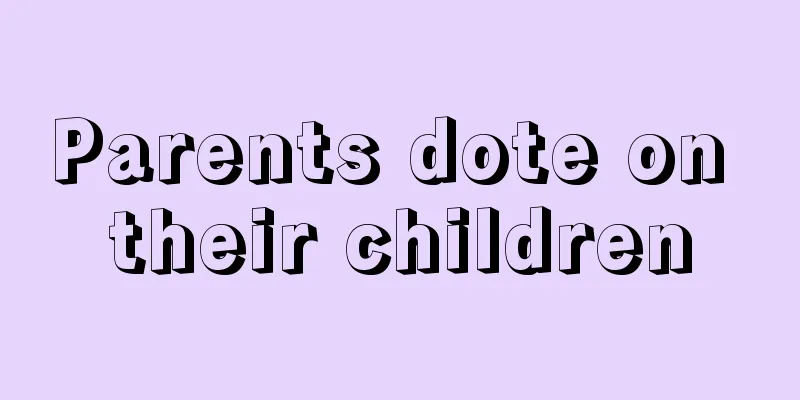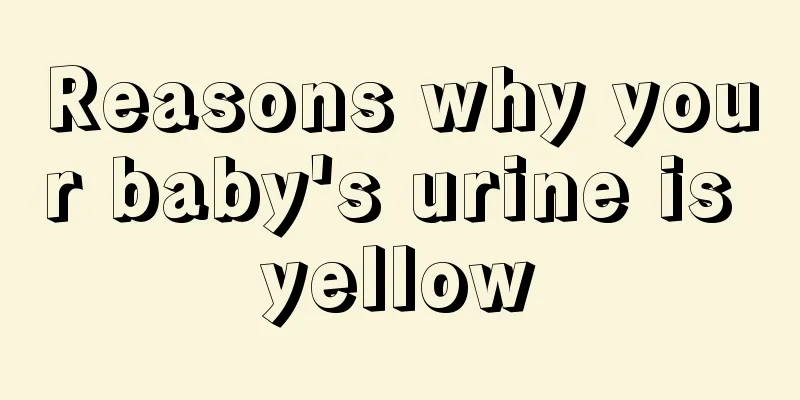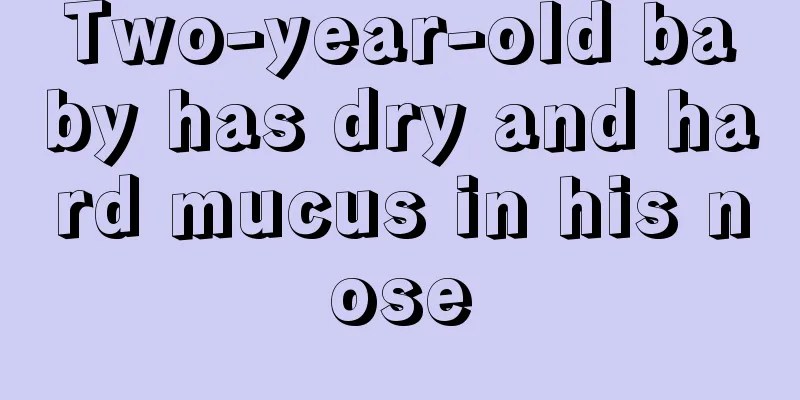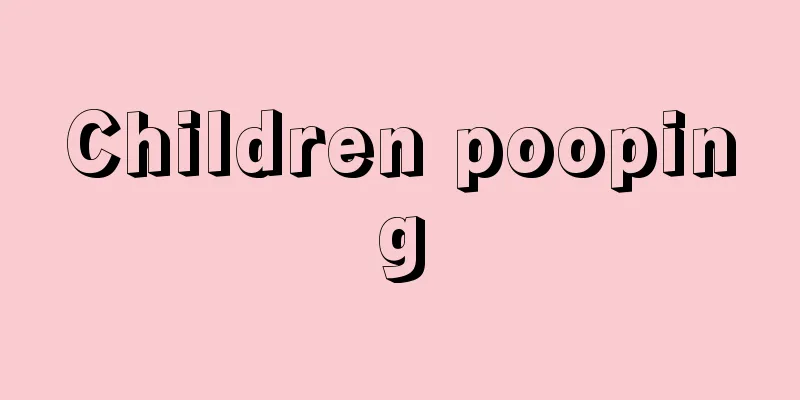What should I do if my child has acute gastroenteritis and fever?
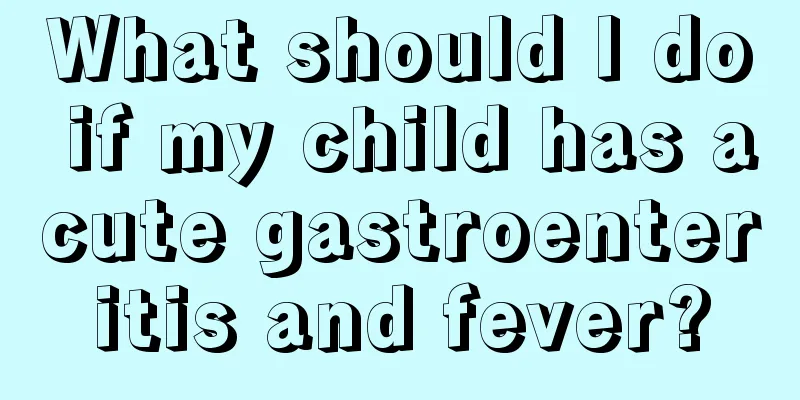
|
Seasonal changes can easily cause the baby's resistance to deteriorate, and children are prone to acute gastroenteritis due to improper diet. Generally, acute gastroenteritis in babies is caused by indigestion. Most acute gastroenteritis symptoms include fever, vomiting, diarrhea, and fever. At this time, parents should take their children to the hospital in time. The earlier the treatment, the easier it is to recover. What to do if a child has a fever due to gastroenteritis Children under five years old often suffer from vomiting and diarrhea in autumn and winter. This is mostly caused by rotavirus gastroenteritis, which is one of the common children's diseases. Rotavirus is the most important cause of acute gastroenteritis in children, accounting for 5–10% of all pediatric gastroenteritis and 10–50% of hospitalizations for diarrhea. Common routes of infection for gastroenteritis are eating unclean food or drinking contaminated water, or having close contact with sick people. If a child has a fever due to gastroenteritis, it is acute gastroenteritis and it is recommended that he be sent to the hospital for treatment in time. The treatment of gastroenteritis in children is mainly etiological treatment and symptomatic treatment. That is to say, no matter what causes acute gastroenteritis, we must try to find out the cause and eliminate the root cause in time. Whatever symptoms your baby shows, try to eliminate these harmful symptoms. If it is caused by indigestion, you can adjust your diet and take lactase, yeast tablets, etc.; if it is caused by other diseases in the body, actively treat the disease; if it is caused by unreasonable use of antibiotics, you need to consult a doctor and stop using antibiotics. If your baby loses too much water due to vomiting and diarrhea, you need to replenish water and electrolytes in time. When you have a high fever, you should use physical or medicinal methods to reduce the temperature; if you are deficient in potassium, you should supplement potassium; if you are deficient in calcium, you should supplement calcium. In case of metabolic acidosis or shock, first aid measures should be taken promptly. In addition, your baby should pay attention to his diet during gastroenteritis. For breastfed babies, do not stop feeding when they have diarrhea. Instead, you can reduce the amount of milk, shorten the feeding time, and extend the interval between feedings. Nursing mothers should eat less fat and drink more water before breastfeeding to dilute the milk and facilitate the baby's digestion. For babies who are bottle-fed or mixed-fed, do not add new complementary foods when they have diarrhea. When the baby has severe diarrhea, stop feeding milk and fast for 6 to 8 hours. During the fasting period, you can feed carrot soup, scorched rice soup, rice soup and applesauce. Carrot soup is low in calories, little in fat, and contains fruit acids and vitamins, which can help form stools. Apple fibers are finer, have less irritation to the intestines, are low in fat, and contain fruit acids, which have an astringent effect. Older babies can eat yam porridge, egg drop porridge, soft noodles, etc., but the amount should be reduced. If the baby has problems such as little urine, thirst, dry lips, etc., he should drink oral rehydration saline or sugar and salt water. Treatment of gastroenteritis in children First of all, mild gastroenteritis can heal on its own without treatment. However, in daily life, acute gastroenteritis is the most common in children. Here are the treatment methods for acute gastroenteritis: 1. Pay attention to fluid replacement and avoid dehydration Pay attention to dehydration symptoms: whether the child urinates less (the baby needs fewer diaper changes), cries without tears, has dry and inelastic skin, or has a sunken fontanelle. Regardless of whether the child has received an IV drip or not, you can buy electrolyte water specifically for diarrhea and give it to your child to drink as water. An IV may be necessary if a child's level of consciousness is decreased or if dehydration is severe. But oral rehydration therapy is still a good way to replenish fluids. Drinks high in simple sugars, such as soda, fruit juice, etc., are not recommended for children under 5 years old because they may worsen diarrhea. If there is no special oral rehydration solution or it tastes bad, plain water can also be used. If indicated, nasogastric tubes can also be used in children to supplement fluids. 2. Pay attention to diet and continue breastfeeding Breastfed babies are advised to continue feeding as usual. Formula-fed infants should continue formula feeding immediately after ORT rehydration. You can try brewing it with half milk (i.e. diluting the concentration by half) first. If the diarrhea condition does not improve within 3-7 days, you may need to switch to lactose-free milk powder (i.e. commercially available laxative milk powder) under the doctor's instructions. 3. Antiemetics Antiemetic medications may help treat vomiting in children, but they must be taken as directed by your doctor. Ondansetron has some utility, with a single dose reducing the need for intravenous fluids, hospitalization, and vomiting. However, the use of ondansetron may be associated with an increased risk of hospital readmission in children. If clinically necessary, ondansetron can also be administered orally in the intravenous form. Metoclopramide may be effective. 4. Antibiotics Antibiotics are not routinely used for gastroenteritis but may be recommended if symptoms are particularly severe or if a susceptible bacterium is identified or a bacterial infection is suspected. The World Health Organization (WHO) recommends that antibiotics be used for children who have both blood in their stools and a fever. 5. Antidiarrheal drugs Do not use antidiarrheal medicines in children—they may be dangerous. Antidiarrheal drugs have a theoretical risk of complications, although clinical experience suggests that this is unlikely, and are not recommended in cases of diarrhea with blood in the stool or fever. Loperamide is an opioid analog commonly used for the symptomatic treatment of diarrhea. However, loperamide is not suitable for use in children because the drug may cross the immature blood-brain barrier in children and cause toxicity. Children's gastroenteritis is much more complicated than adult gastroenteritis, so be sure to see a doctor. |
<<: Girls have small bumps on their vulva
>>: The baby has red pimples on his body
Recommend
Is it ok to drip milk into baby's eyes?
It is said that breast milk is a panacea. When ba...
Is it normal for a baby to have a long body and short legs as shown by B-ultrasound?
When a woman is pregnant, she will definitely go ...
2 year old baby hair loss
When the seasons change, we will find that our ha...
What to do if something gets into your child's nose
Children are particularly curious about everythin...
What should I do if my baby cries when breastfeeding?
Breast milk is the best way to feed our babies. B...
Why does a 2-month-old baby not sleep and cry during the day?
We all know that when a child is less than 100 da...
Height of three-year-old girl
Although a child's height is determined by hi...
What foods are good for children's stomach and intestines?
If we want to help children regulate their stomac...
What to do if a six-year-old child has a tooth growing inside
Many children are prone to having teeth growing i...
What to do if your baby has colic?
Colic is a symptom that often occurs in infants. ...
Early education of language and crawling skills for one year and eight months old babies
A one year and eight month old baby is almost abl...
Four fruits that may affect children's health
With the development of the times and the improve...
Children's nosebleeds in hot weather
As the weather changes, the human body changes wi...
Do children with conjunctivitis blink frequently?
Conjunctivitis is a common eye disease in childre...
How many shots are needed for hand, foot and mouth
Hand, foot and mouth disease is a very serious di...

